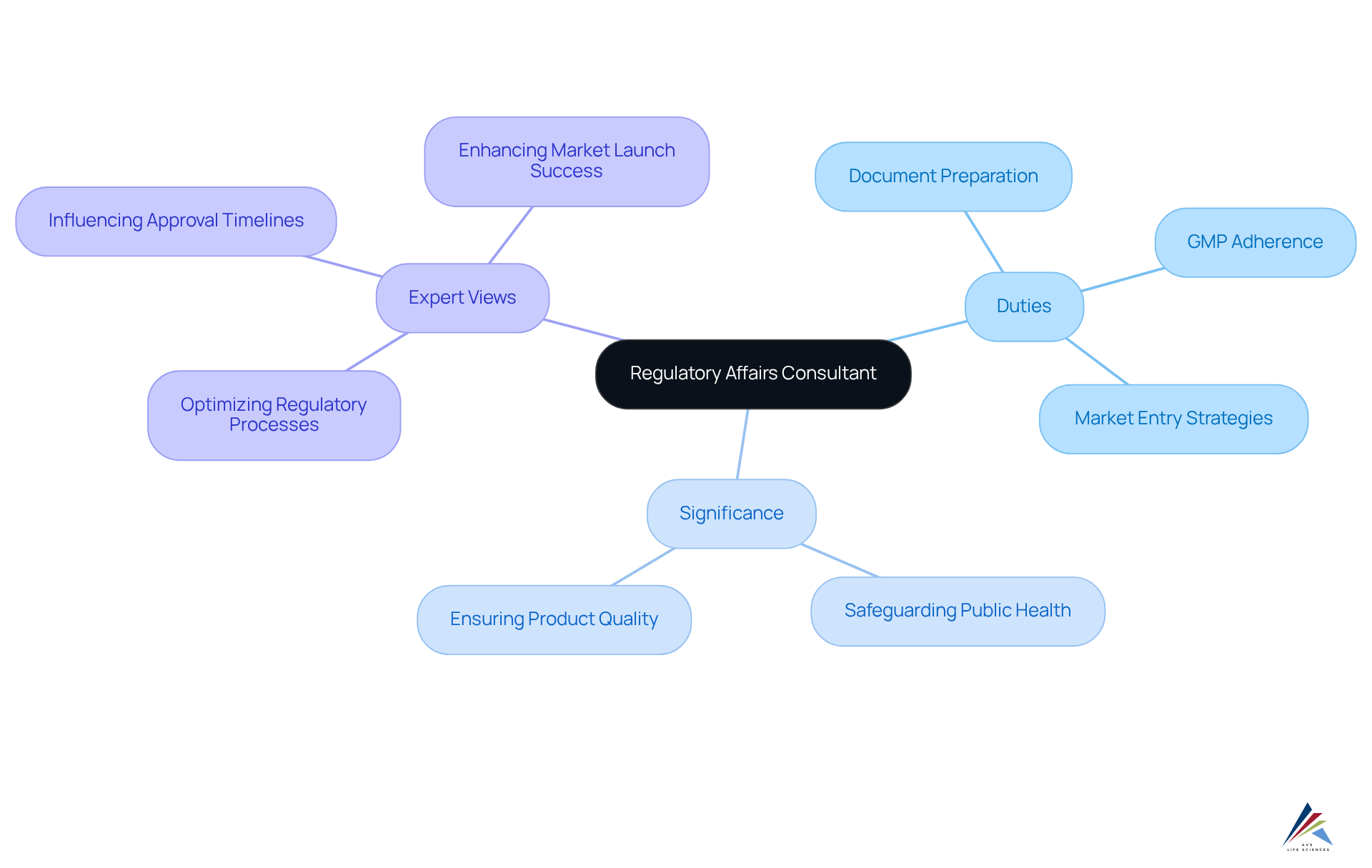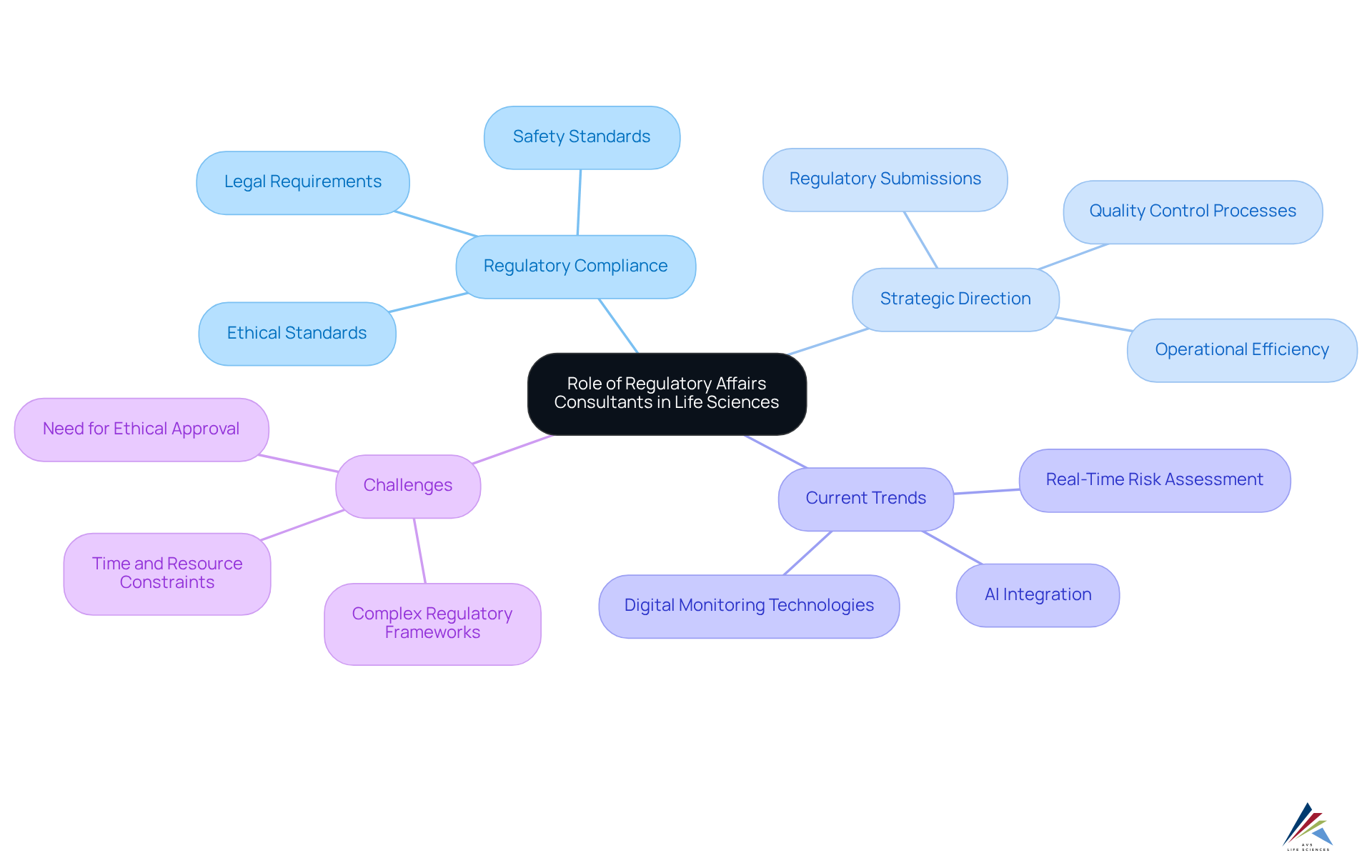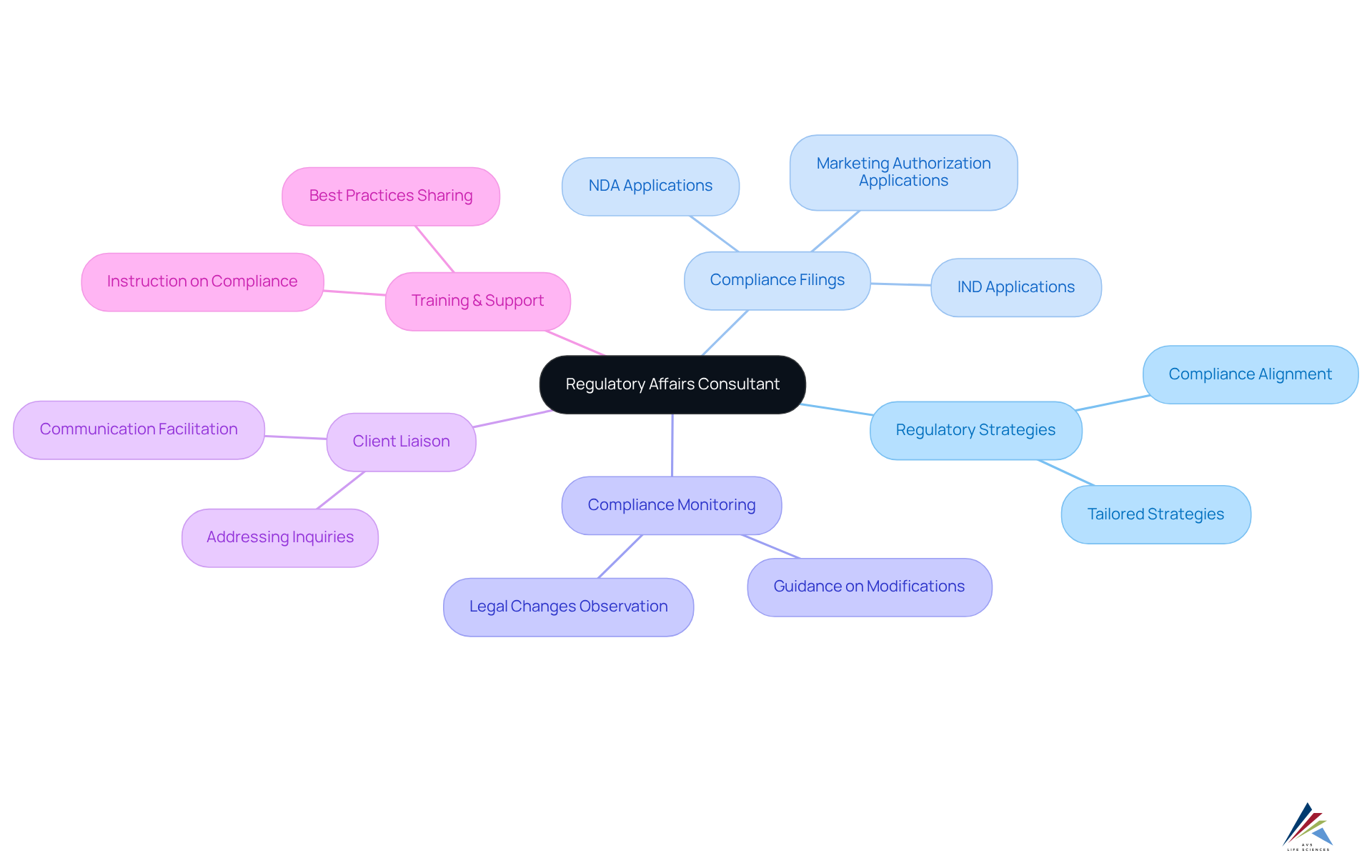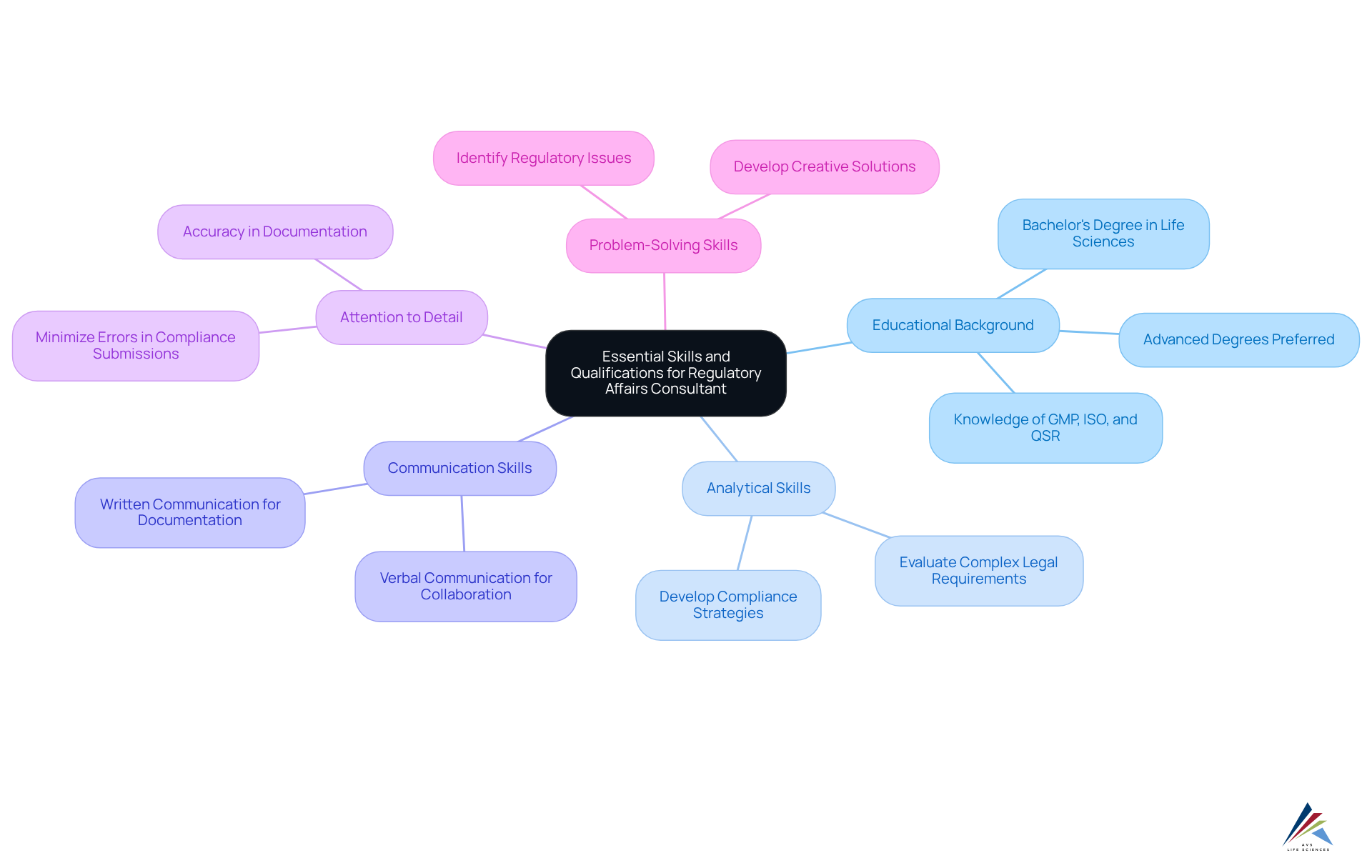Understanding the Role of a Regulatory Affairs Consultant

Overview
Regulatory affairs consultants are indispensable in ensuring compliance with regulations in the pharmaceutical, biotechnology, and medical device industries. They focus on critical tasks such as:
- Document preparation for product approvals
- Adherence to Good Manufacturing Practices (GMP)
By navigating complex regulatory landscapes, these experts optimize approval timelines and safeguard public health, ensuring that products are safe, effective, and of high quality before market release. Their expertise is essential in addressing compliance challenges, providing detailed solutions, and ultimately reinforcing the importance of regulatory adherence in protecting consumers.
Introduction
Navigating the intricate world of life sciences demands not only innovative breakthroughs but also an unwavering commitment to compliance. Regulatory affairs consultants occupy a pivotal role in this landscape, ensuring that pharmaceutical and biotechnology companies adhere to complex regulations while delivering safe and effective products to market.
As the regulatory environment grows increasingly stringent and dynamic, a crucial question emerges: how can these consultants streamline compliance processes and enhance product approval timelines amidst escalating challenges?
By exploring their essential functions and the skills required to excel in this field, we unveil the profound impact they wield on the future of healthcare innovation.
Define Regulatory Affairs Consultant
A regulatory affairs consultant is a specialized professional dedicated to ensuring that pharmaceutical, biotechnology, and medical device companies comply with all relevant regulations and standards. Their main duties involve managing the complex legal framework, which includes:
- The preparation and submission of documents for product approvals
- Adherence to Good Manufacturing Practices (GMP)
- The development of strategies for market entry
This role is vital for safeguarding public health, as it ensures that products are safe, effective, and of high quality prior to market release.
Expert views highlight the significance of these consultants in optimizing regulatory processes, which can greatly influence product approval timelines. Successful compliance affairs consulting projects in biotechnology demonstrate how these professionals enable efficient navigation through intricate requirements, ultimately accelerating the path to market. By providing strategic guidance and ensuring thorough documentation, a regulatory affairs consultant plays a crucial role in enhancing the likelihood of timely approvals and successful product launches in the competitive life sciences landscape.

Contextualize the Role in Life Sciences
In the life sciences field, affairs consultants serve as essential navigators in the intricate landscape of scientific innovation and regulatory compliance. As organizations endeavor to develop groundbreaking therapies and medical devices, they encounter an increasingly complex oversight environment marked by stringent guidelines and rapidly evolving standards. These regulatory affairs consultants offer invaluable strategic direction on regulatory submissions, ensuring that products not only fulfill safety and efficacy criteria but also adhere to legal and ethical standards. Their expertise as a regulatory affairs consultant is crucial for organizations aiming to introduce innovative solutions to the market while adeptly managing regulatory challenges.
A transformative example of this is AVS Life Sciences' recent collaboration with a notable biotechnology firm in San Francisco. AVS facilitated the enhancement of their manufacturing facility from a Biosafety Level 1 GMP environment to a Level 2 GMP facility, completing the project on time and within budget. This upgrade not only refined the quality control processes but also ensured compliance with legal standards, allowing the client to focus on developing targeted antibodies for cancer treatment. The documentation efforts by AVS were acknowledged by the client’s quality assurance team for exhibiting full traceability, a critical aspect in the life sciences sector. Importantly, the project unveiled significant lessons regarding the necessity of thorough testing and system checks, prompting the client to reassess their operational processes and enhance their quality assurance protocols.
Current trends indicate a rise in oversight scrutiny, compelling businesses to invest in sophisticated compliance systems and digital monitoring technologies, often with the guidance of a regulatory affairs consultant. This shift is driven by the need for real-time risk assessment and transparent reporting, both of which are vital for ensuring patient safety and compliance. For instance, the integration of digital solutions for adherence, such as AI and cloud computing, is revolutionizing how life sciences firms approach oversight processes, boosting operational efficiency and reducing human error.
Nevertheless, the path to compliance is often navigated with the help of a regulatory affairs consultant due to the numerous challenges. Life sciences firms often grapple with time and resource constraints that complicate adherence to legal requirements. Additionally, the necessity for ethical approval from institutional review boards (IRBs) and compliance with Good Clinical Practice (GCP) guidelines introduces layers of complexity to clinical trials. These challenges underscore the importance of a regulatory affairs consultant who can facilitate effective communication among researchers, sponsors, and oversight agencies, ultimately aiding in the successful navigation of the compliance landscape.

Outline Key Responsibilities and Tasks
Key responsibilities of a regulatory affairs consultant include several vital tasks that ensure successful product development and compliance with regulatory standards.
Regulatory affairs consultants are responsible for crafting comprehensive regulatory strategies tailored to product development and market entry, ensuring alignment with evolving regulatory requirements. This strategic method is crucial; companies that implement effective compliance strategies can greatly shorten filing timelines, resulting in considerable financial advantages.
The role of a regulatory affairs consultant includes preparing and reviewing compliance filings, such as Investigational New Drug (IND) applications, New Drug Applications (NDA), and marketing authorization applications, as a core function. High-quality documentation is essential; studies indicate that incomplete submissions can lead to delays, with approximately 25% of new molecular entities receiving priority review designation, resulting in faster approval times.
- Compliance Monitoring: Ongoing observation of legal changes is vital. A regulatory affairs consultant guides clients on essential modifications to uphold compliance, as numerous companies encounter recurring compliance challenges that can impede their market readiness.
The regulatory affairs consultant serves as the primary contact between clients and oversight agencies, facilitating communication and addressing inquiries. This position is crucial in managing the intricacies of compliance interactions, particularly during essential stages of the filing process.
A regulatory affairs consultant provides training and support by offering instruction to internal teams on compliance requirements and best practices, ensuring that all stakeholders are knowledgeable and adherent. Equipping groups with information on documentation standards and filing procedures can significantly improve the effectiveness of compliance processes.
Integrating these duties into a unified oversight strategy simplifies the submission process and encourages a culture of adherence and proactive interaction with oversight bodies. For customized consulting solutions in quality management and compliance with regulations, connect with AVS Life Sciences today!

Identify Essential Skills and Qualifications
To excel as a regulatory affairs consultant, individuals must possess a robust set of skills and qualifications that are critical in navigating the complexities of compliance:
-
Educational Background: A bachelor's degree in life sciences, pharmacy, or a related field is typically required, with many employers favoring candidates with advanced degrees. This preference aligns with the increasing demand for compliance professionals, as the market is projected to reach USD 30.16 billion by 2030, reflecting a compound annual growth rate (CAGR) of 9.1%. A regulatory affairs consultant needs a comprehensive understanding of compliance knowledge, including Good Manufacturing Practices (GMP), ISO standards, and Quality System Regulations (QSR), which is essential. This knowledge is vital as oversight professionals navigate intricate adherence environments. Strong analytical skills are crucial for a regulatory affairs consultant to evaluate complex legal requirements and develop effective compliance strategies. The ability to interpret regulations accurately can significantly influence project outcomes. Outstanding verbal and written communication skills are necessary for preparing documentation and collaborating effectively with a regulatory affairs consultant. Transparent communication ensures that all stakeholders remain aligned and informed throughout the compliance process.
-
Attention to Detail: A meticulous approach to work is critical, as even minor errors in compliance submissions can result in significant delays or rejections. Accuracy in documentation is a key factor in achieving successful compliance with regulations. As a regulatory affairs consultant, having problem-solving skills is paramount for the capacity to identify issues and develop creative solutions to navigate regulatory challenges effectively. Regulatory affairs professionals frequently encounter unexpected hurdles, making innovative thinking essential for overcoming these obstacles.

Conclusion
Regulatory affairs consultants stand as essential navigators in the complex landscape of life sciences, guiding companies through the intricate regulations that govern the pharmaceutical, biotechnology, and medical device industries. Their expertise not only streamlines product approval processes but also protects public health by ensuring that only safe and effective products enter the market.
This article has underscored the multifaceted role of regulatory affairs consultants. From crafting comprehensive regulatory strategies and managing compliance documentation to facilitating communication with oversight agencies, these professionals are pivotal in expediting market entry. Furthermore, current trends such as the increasing integration of digital technologies and the rising demand for real-time compliance monitoring highlight the necessity for skilled consultants in an ever-evolving regulatory environment.
The importance of regulatory affairs consultants cannot be overstated. As the life sciences sector continues to innovate amidst heightened scrutiny, investing in the expertise of these professionals becomes crucial for companies seeking successful product launches. By embracing this guidance, organizations not only enhance compliance but also contribute to the advancement of healthcare solutions that can significantly improve lives.
Frequently Asked Questions
What is a regulatory affairs consultant?
A regulatory affairs consultant is a specialized professional who ensures that pharmaceutical, biotechnology, and medical device companies comply with all relevant regulations and standards.
What are the main duties of a regulatory affairs consultant?
Their main duties include preparing and submitting documents for product approvals, ensuring adherence to Good Manufacturing Practices (GMP), and developing strategies for market entry.
Why is the role of a regulatory affairs consultant important?
This role is vital for safeguarding public health by ensuring that products are safe, effective, and of high quality before they are released to the market.
How do regulatory affairs consultants influence product approval timelines?
They optimize regulatory processes, which can greatly influence the speed of product approvals by providing strategic guidance and ensuring thorough documentation.
What impact do regulatory affairs consultants have on biotechnology projects?
Successful compliance affairs consulting projects in biotechnology demonstrate that these professionals enable efficient navigation through intricate regulatory requirements, ultimately accelerating the path to market.
How do regulatory affairs consultants contribute to product launches in the life sciences sector?
By enhancing the likelihood of timely approvals and successful product launches, regulatory affairs consultants play a crucial role in the competitive life sciences landscape.
